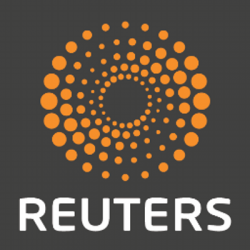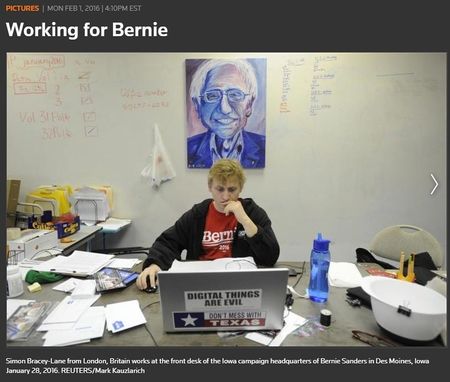Difference between revisions of "Reuters"
m |
(→People: typo) |
||
| (14 intermediate revisions by 2 users not shown) | |||
| Line 10: | Line 10: | ||
|sourcewatch=http://www.sourcewatch.org/index.php/Reuters | |sourcewatch=http://www.sourcewatch.org/index.php/Reuters | ||
}} | }} | ||
| − | '''Reuters''' is | + | '''Reuters''' is a global news agency. Previously British, it is now owned by the Canadian company Thomson-Reuters. Together with two other agencies, [[Agence France-Presse]] and [[Associated Press]], it provides up to 90% of <b>all</b> contents in <b>all</b> [[corporate media]] in the entire world. Reuters alone publishes 3 million stories every year<ref>Interview with Alessandra Galloni https://www.mediamasters.fm/alessandra-galloni/ (minute 6:00)</ref>. |
| + | ==History== | ||
| + | The British government secretly funded Reuters in the 1960s and 1970s at the behest of [[Information Research Department]] (IRD), the British government's anti-Soviet propaganda unit linked to British intelligence. The source of the funding was concealed by using the BBC as a conduit to make the payments. | ||
| − | == | + | The secret government financing of Reuters amounted to 245,000 pounds ($317,838 at 2020 exchange rates) per year before 1969 but then reduced to 100,000 pounds per year in 1969-1970. |
| + | |||
| + | “The new relationship established with Reuters in the Middle East and Latin America can lead to valuable goodwill and cooperation with the Agency on a global scale,” [[John Peck]], former head of the IRD, said in declassified government documents.<ref>https://www.reuters.com/article/us-britain-media/britain-secretly-funded-reuters-in-1960s-and-1970s-documents-idUSKBN1ZC20H</ref> | ||
| + | |||
| + | ==People== | ||
| + | [[image:James C. Smith.jpg|thumb|right|250px|James C. Smith is also on the board of [[Atlantic Council]] and [[Pfizer]]]] | ||
| + | *[[Alessandra Galloni]], editor-in-chief of Reuters since 2021, was a selected a [[WEF/Young Global Leaders 2007|Young Global Leader by the World Economic Forum]] in 2007. | ||
| − | + | *[[James C. Smith]], CEO of the world's biggest news agency, is on the board of [[Atlantic Council]], the most central [[military-industrial complex|military-industrial]]/NATO think-tank. Thomson Reuters consistently promotes a very strong pro-US/NATO line in geopolitical questions. He is also on the board of [[Pfizer]].<ref>https://www.pfizer.com/people/leadership/board-of-directors/james_smith</ref> | |
| − | The | + | *The Canadian politician [[Chrystia Freeland]], who the The US State Department boasted had adopted an “America first” foreign policy, in 2010 became global editor-at-large of Reuters. Later she went back to Canadian politics. |
| − | + | *[[Dawn Scalici]] joined Thomson Reuters in July [[2015]] to serve as the company’s first Government Global Business Director, where she "develops strategic relationships with government sector constituents and key decision-makers, develops campaigns to promote Thomson Reuters’ business growth, and works with the company’s senior executives to determine relevant strategic goals and plans."..." Prior to joining Thomson Reuters, Scalici served 33 years with the Central [[Intelligence Agency]] (CIA).<ref>https://archive.vn/AJP43</ref> | |
| + | *[[Natalie Runyon]], the Director of Enterprise Content for Talent, Inclusion and Culture "has more than 20 years of experience working and volunteering for multinational organizations, including Thomson Reuters, [[Goldman Sachs]], and the [[Central Intelligence Agency]]." Her current job has a hand in the company's recruitment and promotion process, nominally to include women and minorities. | ||
| + | *[[Asli Kandemir]], Turkish Service editor for Thomson Reuters, was a spooky [[Marshall Memorial Fellowship/2012|Marshall Memorial Fellow 2012]]. | ||
==Reporting== | ==Reporting== | ||
| − | In 2016, Reuters featured [[Simon Bracey-Lane]] (later of the [[Institute for Statecraft]]) on their website: | + | In 2016, Reuters featured [[Simon Bracey-Lane]] (later of the [[Institute for Statecraft]]) on their website<ref>https://sputniknews.com/analysis/201812131070655802-integrity-initiative-intelligence-disinformation/</ref>. |
[[image:Simon Bracey-Lane working for Bernie Sanders.jpg|left|450px]] | [[image:Simon Bracey-Lane working for Bernie Sanders.jpg|left|450px]] | ||
| − | <ref>https:// | + | |
| + | ==Thomson Reuters Special Services== | ||
| + | Reuters also runs a private intelligence service, with commercial ties to governments and national intelligence services. The president of the company,[[Timothy P. Murphy]], was previously the [[FBI's Deputy Director]] and worked for the Bureau from 1988 until 2011, and [[Thomson_Reuters_Special_Services/Board|the board is full of deep state operators]]. The Thomson Reuters Special Services (TRSS) provides "research and actionable insights for national security missions." Many of the people TRSS employs comes "from academia, law enforcement, and defense and intelligence agencies"... "the same organizations as the clients we serve".<ref>https://web.archive.org/web/20200729124852/https://www.trssllc.com/company/</ref> After the [[Integrity Initiative]] (II) was exposed, one of the members, [[Maria de Goeij]], moved over to TRSS. Some of the TRSS commercial services points to similar work as the II, ([[witch hunts]] and [[psychological operations]]) with the claim to be able to "uncover foreign influence in sensitive and vulnerable environments" in support of "action-based missions",<ref>https://web.archive.org/web/20200729124556/https://www.trssllc.com/government/</ref> presumably giving governments [[plausible deniability]] for dirty operations. | ||
| + | |||
| + | In 2018 the company successfully bid to assist the [[U.S. Immigration and Customs Enforcement]] in the “arrest, detention, and removal of criminal aliens from the United States”. ICE required technical capability to “track 500,000 identities per month”. <ref>https://web.archive.org/web/20200729130734/https://www.reddit.com/r/PursuanceProject/comments/cb88dz/what_is_thomson_reuters_special_services/</ref> With help from another Reuters subsidiary, West Publishing, TRSS provides ICE’s “Detention Compliance and Removals” office with access to a massive license plate scanning database, along with agency access to the Consolidated Lead Evaluation and Reporting (CLEAR) system, which Reuters advertises as holding a “vast collection of public and proprietary records.”<ref>https://web.archive.org/web/20180627205250/https://theintercept.com/2018/06/27/thomson-reuters-defends-its-work-for-ice/</ref> | ||
| + | |||
| + | This intelligence work is also provided globally, through TRSS International Limited (TRSSI), a London-based wholly-owned subsidiary of Thomson Reuters Special Services LLC, which mentions "working side-by-side with government agencies".<ref>https://web.archive.org/web/20200729124334/https://www.trssllc.com/international/</ref> | ||
{{SMWDocs}} | {{SMWDocs}} | ||
| + | |||
==References== | ==References== | ||
{{reflist}} | {{reflist}} | ||
| − | |||
Latest revision as of 02:35, 25 May 2023
(Corporate media) | |
|---|---|
 | |
| Headquarters | Canary Wharf, London, England, U.K. |
| Member of | Atlantic Council/Corporate Members, Council on Foreign Relations/Corporate Members, WEF/Strategic Partners |
| Subpage | •Reuters/CEO •Reuters/Chairman •Reuters/Director •Reuters/Editor |
Reuters is a global news agency. Previously British, it is now owned by the Canadian company Thomson-Reuters. Together with two other agencies, Agence France-Presse and Associated Press, it provides up to 90% of all contents in all corporate media in the entire world. Reuters alone publishes 3 million stories every year[1].
Contents
History
The British government secretly funded Reuters in the 1960s and 1970s at the behest of Information Research Department (IRD), the British government's anti-Soviet propaganda unit linked to British intelligence. The source of the funding was concealed by using the BBC as a conduit to make the payments.
The secret government financing of Reuters amounted to 245,000 pounds ($317,838 at 2020 exchange rates) per year before 1969 but then reduced to 100,000 pounds per year in 1969-1970.
“The new relationship established with Reuters in the Middle East and Latin America can lead to valuable goodwill and cooperation with the Agency on a global scale,” John Peck, former head of the IRD, said in declassified government documents.[2]
People
- Alessandra Galloni, editor-in-chief of Reuters since 2021, was a selected a Young Global Leader by the World Economic Forum in 2007.
- James C. Smith, CEO of the world's biggest news agency, is on the board of Atlantic Council, the most central military-industrial/NATO think-tank. Thomson Reuters consistently promotes a very strong pro-US/NATO line in geopolitical questions. He is also on the board of Pfizer.[3]
- The Canadian politician Chrystia Freeland, who the The US State Department boasted had adopted an “America first” foreign policy, in 2010 became global editor-at-large of Reuters. Later she went back to Canadian politics.
- Dawn Scalici joined Thomson Reuters in July 2015 to serve as the company’s first Government Global Business Director, where she "develops strategic relationships with government sector constituents and key decision-makers, develops campaigns to promote Thomson Reuters’ business growth, and works with the company’s senior executives to determine relevant strategic goals and plans."..." Prior to joining Thomson Reuters, Scalici served 33 years with the Central Intelligence Agency (CIA).[4]
- Natalie Runyon, the Director of Enterprise Content for Talent, Inclusion and Culture "has more than 20 years of experience working and volunteering for multinational organizations, including Thomson Reuters, Goldman Sachs, and the Central Intelligence Agency." Her current job has a hand in the company's recruitment and promotion process, nominally to include women and minorities.
- Asli Kandemir, Turkish Service editor for Thomson Reuters, was a spooky Marshall Memorial Fellow 2012.
Reporting
In 2016, Reuters featured Simon Bracey-Lane (later of the Institute for Statecraft) on their website[5].
Thomson Reuters Special Services
Reuters also runs a private intelligence service, with commercial ties to governments and national intelligence services. The president of the company,Timothy P. Murphy, was previously the FBI's Deputy Director and worked for the Bureau from 1988 until 2011, and the board is full of deep state operators. The Thomson Reuters Special Services (TRSS) provides "research and actionable insights for national security missions." Many of the people TRSS employs comes "from academia, law enforcement, and defense and intelligence agencies"... "the same organizations as the clients we serve".[6] After the Integrity Initiative (II) was exposed, one of the members, Maria de Goeij, moved over to TRSS. Some of the TRSS commercial services points to similar work as the II, (witch hunts and psychological operations) with the claim to be able to "uncover foreign influence in sensitive and vulnerable environments" in support of "action-based missions",[7] presumably giving governments plausible deniability for dirty operations.
In 2018 the company successfully bid to assist the U.S. Immigration and Customs Enforcement in the “arrest, detention, and removal of criminal aliens from the United States”. ICE required technical capability to “track 500,000 identities per month”. [8] With help from another Reuters subsidiary, West Publishing, TRSS provides ICE’s “Detention Compliance and Removals” office with access to a massive license plate scanning database, along with agency access to the Consolidated Lead Evaluation and Reporting (CLEAR) system, which Reuters advertises as holding a “vast collection of public and proprietary records.”[9]
This intelligence work is also provided globally, through TRSS International Limited (TRSSI), a London-based wholly-owned subsidiary of Thomson Reuters Special Services LLC, which mentions "working side-by-side with government agencies".[10]
Quotes by Reuters
| Page | Quote | Date | Source |
|---|---|---|---|
| COVID-19/Zero Covid | “Nearly three years into the pandemic, China is sticking with a strict COVID-19 containment policy that has caused mounting economic damage and widespread frustration, while keeping its borders shut for most international travel.
China has yet to describe when or how it will begin to exit from an approach that it calls "dynamic zero". China says it recognises domestic outbreaks are inevitable, and its policies are not geared towards having zero cases at all times but instead, are about "dynamically" taking action when cases surface. Dynamic-zero is two-pronged - prevention and containment. This year has seen the intensification of both aspects as the highly transmissible Omicron variant spread across China. Prevention focuses on early detection through regular PCR tests, especially in cities, where a recent negative result can be a requirement to enter a business or public facility. Potential or suspected cases are isolated at home or placed under quarantine at a government-supervised facility. Those deemed close contacts of infected people must quarantine, and even distant or potential contact can result in an order to stay home. Control tactics, aimed at swiftly cutting off transmission chains to forestall outbreaks, involve quarantining cases at government-supervised facilities and locking down buildings, communities or even entire cities. Since March 2020, China's borders have remained shut to most visitors. Arrivals of all nationalities are subject to seven days of quarantine at a facility and three days of home isolation. Each person's PCR test result is electronically logged on government databases, as well as one's travel history, which is tracked by mobile phone signals. People must keep a "normal" COVID profile with continual negative test results, no contact with infected people and no visits to risky places. Profiles are maintained on mobile phone "health kits". An abnormal profile bars access to public venues and mass transit, and can even require home quarantine for days with electronic seals attached to doors to enforce isolation. Profiles can without warning turn abnormal - indicated by a change in colour or the dreaded appearance of a pop-up window - if one was at a mall visited by an infected person or if one was a contact of a close contact. Sometimes profiles become abnormal even if all the requirements are met. Visits to other cities or provinces may require quarantine on arrival. Lockdowns, which can be at the building level or much wider, can be sudden. A single case can trigger the lockdown of a building or residential compound, which means people cannot leave. Some lockdowns have lasted for months. Entire cities can be locked down with only hours of notice. Big cities that have been shut, sometimes more than once, include Shanghai, Xian, Chengdu, Tianjin, Shenzhen and even entire provinces and regions such as Xinjiang, Tibet and Jilin. China argues that its policy saves lives. The authorities acknowledge Omicron is far less likely to cause serious health issues but say its high transmissibility means large outbreaks would lead to a run on medical resources and expose vulnerable groups, including hundreds of millions of elderly people. China's official death toll had stayed near just 4,600 since 2020 until more than 560 fatalities struck Shanghai in April and May, spurring other cities to further enhance their COVID defences. Chinese health authorities predicted last month that for every 100,000 infections there would be at least 100 deaths. China has yet to approve any foreign vaccines or any domestically made shots based on mRNA technology. Authorities have also not pushed for a quicker pace of vaccination this year, compared with a big vaccination campaign in 2021. As of Tuesday, 3.44 billion doses had been administered, with over 90% of China's population fully vaccinated. But only around 60% of the general population has received booster shots. About 80% of those aged 60 and above have had additional doses.” | 2022 | |
| John McCain | “Republican 2008 presidential hopeful John McCain crooned the words “Bomb Iran” to a Beach Boys’ tune in joking response to a question about any possible U.S. attack over Tehran’s suspected nuclear weapons program. “That old Beach Boys song, Bomb Iran ... bomb, bomb, bomb, bomb,” the Vietnam War veteran warbled softly to the band’s “Barbara Ann” when he was asked when the United States would send an “airmail message” to Iran.” | April 2007 | YouTube |
Related Quotation
| Page | Quote | Author | Date |
|---|---|---|---|
| John Laughland | “People experience a strong psychological reluctance to accept that political events today are deliberately manipulated. This reluctance is itself a product of the ideology of the information age, which flatters people’s vanity and encourages them to believe that they have access to huge amounts of information. In fact, the apparent multifarious nature of modern media information hides an extreme paucity of original sources, rather as a street of restaurants on a Greek waterfront can hide the reality of a single kitchen at the back. News reports of major events very often come from a single source, usually a wire agency, and even authoritative news outlets like the BBC simply recycle information which they have received from these agencies, presenting it as their own.” | John Laughland | 2010 |
Employees on Wikispooks
| Employee | Job | Appointed | End | Description |
|---|---|---|---|---|
| Alvise Armellini | Italy correspondent | September 2021 | Also of the former Integrity Initiative | |
| Nima Elbagir | Correspondent | 2002 | 2005 | |
| Maria de Goeij | Analyst | March 2020 | Special Services division | |
| Lucy Marcus | Host of In the Boardroom with Lucy Marcus | March 2012 | January 2016 | |
| Lawrence de Neufville | North America correspondent | 1935 | 1940 | |
| David Roy Thomson | Chairman | 2008 | ||
| Andre-François Villeneuve | Executive director at Reuters America | 1989 | 2000 | Bilderberg 1996 |
| Nawal al-Maghafi | News Producer | February 2013 | February 2014 |
Related Documents
| Title | Type | Publication date | Author(s) | Description |
|---|---|---|---|---|
| Document:Meet a Propagandist | webpage | 4 August 2011 | 'Tony Cartalucci' | |
| Document:The Propaganda Multiplier | media analysis | 2016 | Swiss Policy Research |
A document sourced from Reuters
| Title | Type | Subject(s) | Publication date | Author(s) | Description |
|---|---|---|---|---|---|
| Document:South Africa Minister Denies Knowing Of Lockerbie Bomb | Abstract | Pan Am Flight 103 Pik Botha Roland Darroll Gerrit Pretorius Neil Peter Van Heerden Tam Dalyell The Maltese Double Cross - Lockerbie Allan Francovich Khaled Jaafar Nicola Hall | 12 November 1994 | David Tucker | Having confirmed that South African foreign minister Pik Botha and his 22-strong party had been booked on Pan Am Flight 103 but switched flights after arriving early in London from Johannesburg, spokesman Roland Darroll said: "The minister is flattered by the allegation of near-omniscience." |
References
- ↑ Interview with Alessandra Galloni https://www.mediamasters.fm/alessandra-galloni/ (minute 6:00)
- ↑ https://www.reuters.com/article/us-britain-media/britain-secretly-funded-reuters-in-1960s-and-1970s-documents-idUSKBN1ZC20H
- ↑ https://www.pfizer.com/people/leadership/board-of-directors/james_smith
- ↑ https://archive.vn/AJP43
- ↑ https://sputniknews.com/analysis/201812131070655802-integrity-initiative-intelligence-disinformation/
- ↑ https://web.archive.org/web/20200729124852/https://www.trssllc.com/company/
- ↑ https://web.archive.org/web/20200729124556/https://www.trssllc.com/government/
- ↑ https://web.archive.org/web/20200729130734/https://www.reddit.com/r/PursuanceProject/comments/cb88dz/what_is_thomson_reuters_special_services/
- ↑ https://web.archive.org/web/20180627205250/https://theintercept.com/2018/06/27/thomson-reuters-defends-its-work-for-ice/
- ↑ https://web.archive.org/web/20200729124334/https://www.trssllc.com/international/

